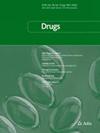Pirfenidone: a review of its use in idiopathic pulmonary fibrosis.
Abstract
Pirfenidone (Esbriet?) is an orally administered, synthetic, pyridone compound that is approved for the treatment of adults with mild to moderate idiopathic pulmonary fibrosis (IPF) in the EU, and for the treatment of IPF in the USA. This article summarizes pharmacological, efficacy and tolerability data relevant to the use of pirfenidone in these indications. In the randomized, double-blind, placebo-controlled, multinational CAPACITY trials in patients with mild to moderate IPF, a significant reduction in the rate of decline in forced vital capacity (FVC) was seen with pirfenidone versus placebo in study 004 but not in study 006. Pirfenidone also reduced the rate of decline in FVC to a significantly greater extent than placebo in the randomized, double-blind, multinational ASCEND trial in this patient population. In addition, pirfenidone showed a significant treatment effect on the 6-min walking test distance and progression-free survival in the ASCEND trial and in a pooled analysis of the CAPACITY trials. Pirfenidone had a manageable tolerability profile in all three studies. Gastrointestinal and skin-related events (e.g. nausea, rash, photosensitivity reaction), which were the most commonly occurring treatment-emergent adverse events, were generally mild to moderate in severity. In addition, a prespecified mortality analysis across all three studies demonstrated a significant reduction in IPF-related and all-cause mortality with pirfenidone. In conclusion, oral pirfenidone is a valuable agent for use in patients with IPF.





